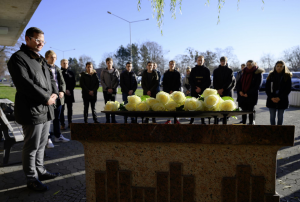Volkswagen recalls its past more judiciously these days

Although the German car-producing giant, Volkswagen, may have been ‘in denial’ for five-and-a-half decades post-WW2, highlights Iain Robertson, at the turn of the New Millennium, it faced up to the many atrocities that had been perpetrated through it.
Despite undertaking several visits to the immense VW car production facility in Wolfsburg, Germany, and possessing a personal awareness of some aspects of the company’s history, I never delved much deeper. It is fair to state that what happened in the 1930s and 1940s had been very carefully reconstituted to avoid drawing excess attention to Adolf Hitler’s role in its existence. Yet, avoidance can also be described as turning a blind eye, or being highly selective, even protective, at very least.
Just last month, the ‘Place of Remembrance of Forced Labour in the Volkswagen Factory’ reached its 20th anniversary. The historic exhibition explores the early history of Volkswagen and forced labour during the Nazi dictatorship. The permanent exhibition in a former air raid shelter of the present Volkswagen factory is visited by around 3,500 people each year. Guests from across the globe not only come from the Volkswagen Group but also interested parties from other companies, schools and universities. They are guided through the exhibition by members of the Volkswagen Heritage team. Incidentally, should you wish to register for a tour, potential visitors only need to send an email to history@volkswagen.de.
During the Second World War, about 20,000 forced labourers worked for the former Volkswagenwerk GmbH. Nowadays, the Volkswagen Group, with about 660,000 employees at more than 120 locations, stands for tolerance, internationality and cosmopolitanism. From 1986 onwards, Volkswagen was one of the first companies in Germany to have its history during the Nazi period investigated comprehensively by historians. These efforts also included meetings and interviews with former forced labourers including Sara Frenkel-Bass (Antwerp, Belgium) and Jean Baudet (Nice, France), both in their 90s and looking very sprightly indeed.
On the occasion of the 20th anniversary of the inauguration of the Place of Remembrance, held on December 17, 1999, both of them provided heart-rending statements. Sara Frenkel-Bass (97) highlighted: “Up to the 1980s, it was difficult for Volkswagen to work honestly on its past and to make direct contacts with former forced labourers. Now we have the exhibition and me and others are invited to Wolfsburg, by Volkswagen. Many things have changed. The people in Wolfsburg are highly interested and provide me with great support on difficult visits, for example to the graves.”
She emphasised: “My message to younger people is: no-one can deny other people the right to live. The death of so many people warns us that we must remember. It is the task of young people here to ensure that this is not forgotten. I place my trust in you, thank you!“
Jean Baudet (97) said: “As one of the last survivors and speaking on behalf of all my dead colleagues, whom were forced labourers at the Volkswagen plant between 1943 and 1945, I would like to express my gratitude to Volkswagen for establishing such a great Place of Remembrance of Forced Labour at the plant, in what is now Wolfsburg, some 20 years ago. This place reminds us of the suffering of forced labourers during those troubled years. I am very proud that I was able to make a contribution by giving my memories and possessions from that time to the company. My most heartfelt wish is that there should never be such a bad time again.”
On the 20th anniversary, 12 current and two former apprentices, Miriam Hilger and Alexander Silbermann, who had been selected to help in shaping the Place of Remembrance, met in the Corporate Archive forum. Following a tour of the exhibition in Bunker 1 together, they discussed the significance of reappraising the beginnings of the company and the crimes committed during the Nazi period on the grounds of the former Volkswagenwerk GmbH from 1943 to 1945. They also talked about topical issues such as right wing populist tendencies in societies characterised by liberal democracies and the growth in anti-Semitic violence that is prevalent today across Europe.
Volkswagen can be translated as ‘People’s Car’, the company being popularised by its best-selling, rear-engined Beetle and later Golf models. Hitler’s regime was able to tap into an immense and ‘free’ labour force, as a means to produce light vehicles (such as the military Kubelwagen) to support the ultimately ill-fated Teutonic war effort. The actual design of the first generation examples lay at the door of Dr Ferdinand Porsche, who eschewed a fee for his services but set ‘in stone’ a means of earning 1DM (DeutschMark) for each vehicle produced, a factor that aided the development of the sports car company to bear his name post-WW2.
After Germany was liberated in 1945, with the demise of Hitler and his regime, a British Army Major, Ivan Hirst, used his engineering initiative to rebuild the heavily bombed factory and help with the revitalisation programme for the area. Despite the remnants of the plant being ignored by Russian and American forces, Hirst could see the potential of producing vehicles for the British Army but he also took a broader view. If anything, VW of today owes a debt of gratitude to that enterprising soldier. A proud Yorkshireman, he passed away on 10th March 2000, aged 84 years.
Despite being largely war-free since those dark days, it is the responsibility of all of us to remember the truth about the past and, with VW Group now commemorating it in such a positive manner, while we should never forget, perhaps we can provide some space for forgiveness.

